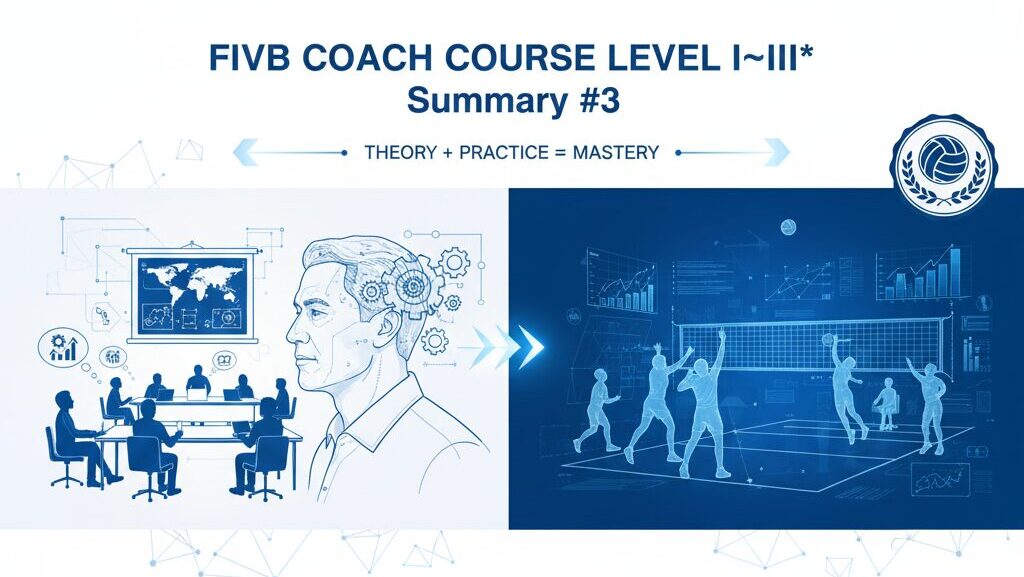In this article, I would like to summarize the process of taking the FIVB Coaches Course Level 3 and my initial impressions of the experience.
FIVB Coaches Course Level 3
After getting my Level 2 license, I was fortunate enough to get a great opportunity and spent one season as the head coach for the V League team, Ligare Sendai.
After the season concluded, I carefully considered my next steps and decided to leave the team to pursue my seven-year-long dream of living abroad and making a living through volleyball. In April 2024, I returned to my hometown in Kagawa Prefecture and began exploring every possibility of working in volleyball overseas.
Luckily, I was presented with an amazing opportunity to be hired as a coaching staff member at a volleyball academy in Singapore, JRT Volleyball Academy.
In mid-July 2024, I started a two-month trial period in Singapore. When I told the academy’s representative that I wanted to take the FIVB Coaches Course Level 3, he readily agreed and encouraged my participation. He had already earned his Level 3 license and motivated me by saying it would be a fantastic learning experience and that I should learn as much as possible.
Procedures, etc.
This was effectively my fifth time going through the application process (having experienced it twice for Level 1 and twice for Level 2, so the procedures for Level 3 went very smoothly. The basic flow was mostly the same as for Levels 1 and 2.
I chose the Kingdom of Thailand as the host country. This was partly because the dates were easy to arrange, but also because of its geographical proximity to Singapore and my strong interest in the remarkable development of volleyball in Thailand in recent years.
Unlike Levels 1 and 2, the participants for Level 3 were very international. I believe this is because there are only a limited number of countries in the world that host Level 3 courses. The 35 participants came from a total of 16 different countries, including not only neighboring Asian nations but also countries in Europe and Africa.
Course Content
The course was conducted through classroom and on-court lectures led by FIVB instructors and volleyball experts (coaches with national team head coaching experience, top FIVB referees, etc.). Participants also had to give their own presentations and on-court lectures on pre-assigned topics.
The two FIVB instructors were John Kessel and Fung Kwun (assistant), and both were very friendly and had a gentle demeanor. The course proceeded in a consistently calm and comfortable atmosphere, which made it a great learning environment.
Instructor-Led Sessions
With John Kessel at the center, he facilitated the entire course, leading both the classroom and on-court lectures. In the classroom sessions, I felt that a significant portion of his talks went beyond top-level volleyball knowledge and his personal experiences. He also focused on the essential nature of volleyball as a sport and, consequently, how we should be training. He spoke passionately about the importance of grassroots volleyball coaching. As someone who has been and will continue to be deeply involved in youth development, this was an invaluable opportunity that reinforced my sense of mission.
The on-court lectures followed a format where participants learned by actively taking part in his training programs. I participated myself and could feel firsthand that every single program was packed with his beliefs and dedication. I felt that the programs were meticulously thought out, with careful consideration for how to make the drills as close to a real game as possible, how to maximize the number of ball touches for players within a given time, and how to keep the players engaged.
Expert-Led Sessions
We also received classroom and on-court lectures from experts, including a former head coach of the Thai national team at this time and a top FIVB referee.
In particular, the sessions led by Mr. Kiattipong Radchatagriengkrai, who previously coached the Thai Women’s National Team (now, he is coach of Thai Women’s National Team again in 2025.), left a strong impression on me.
His classroom lecture focused on the long-term perspective of strengthening the Thai Women’s National Team. His style and the content of his talk conveyed his strong passion and philosophy for coaching. He was also generous in sharing his very valuable experiences, such as the challenges he faced during the team-building process and how he dealt with them.
The on-court lecture was held with the cooperation of young Thai players. Although it was only about an hour long, I was incredibly impressed by how clear the purpose of each drill was and how they were all integrated. I also caught a glimpse of his passionate side in various moments, and it strongly conveyed that he is always serious and dedicated when working with his players.




